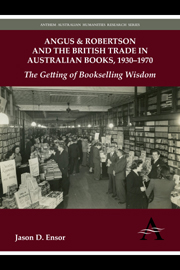 Angus & Robertson and the British Trade in Australian Books, 1930–1970
Angus & Robertson and the British Trade in Australian Books, 1930–1970 Published online by Cambridge University Press: 05 July 2013
I hope it will not be long before the Angus & Robertson joint export apparatus reaps an export harvest for Australian publishers. I think we are well on the way to doing this because so many Australian publishers want to have a UK outlet.
From the late 1940s and 1950s, the London office was characterised by Hector MacQuarrie as one of ‘purely English infancy’. The first half of the 1960s was marked by a maturing identity crisis. Gone was the ‘old type family concern’ in which editorial horsepower was more important than sales or production. In its place was a modern company; a company which was more complex and heavier on the retail side and superintended large-scale shareholder investments that required dividends. Having ‘rocked so violently’ through the Burns’ (and later Packer's) takeover episodes, Angus & Robertson was ‘now fairly steady on her keel’ after the British publisher William Collins (along with George G. Harrap and William Heinemann) provided a ‘stabilizing influence’ through their purchase of 30 per cent of Angus & Robertson's shares.
Content not to throw about its weight, Collins appeared prepared ‘to lend strength to see that no more robber barons upset the place’.
To save this book to your Kindle, first ensure [email protected] is added to your Approved Personal Document E-mail List under your Personal Document Settings on the Manage Your Content and Devices page of your Amazon account. Then enter the ‘name’ part of your Kindle email address below. Find out more about saving to your Kindle.
Note you can select to save to either the @free.kindle.com or @kindle.com variations. ‘@free.kindle.com’ emails are free but can only be saved to your device when it is connected to wi-fi. ‘@kindle.com’ emails can be delivered even when you are not connected to wi-fi, but note that service fees apply.
Find out more about the Kindle Personal Document Service.
To save content items to your account, please confirm that you agree to abide by our usage policies. If this is the first time you use this feature, you will be asked to authorise Cambridge Core to connect with your account. Find out more about saving content to Dropbox.
To save content items to your account, please confirm that you agree to abide by our usage policies. If this is the first time you use this feature, you will be asked to authorise Cambridge Core to connect with your account. Find out more about saving content to Google Drive.